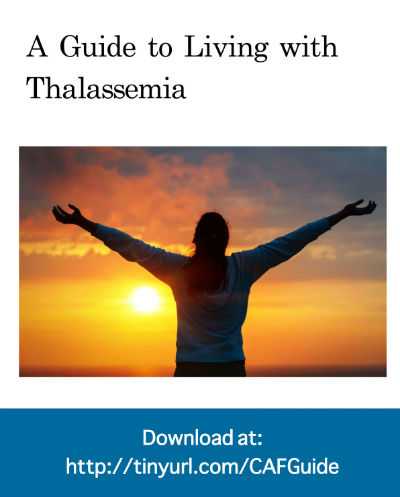Healthy Living
What can a person living with thalassemia do to stay healthy?
A healthy lifestyle is important for everyone. For people living with thalassemia, it is especially important to know that a healthy lifestyle means “managing the disorder”, as well as making healthy choices.
Managing Thalassemia
Thalassemia is a treatable disorder that can be well-managed with blood transfusions and chelation therapy. A person with thalassemia will need to receive medical care on a regular basis from a hematologist (a medical specialist who treats diseases or disorders of the blood) or a doctor who specializes in treating patients with thalassemia. If a doctor has prescribed either blood transfusions or chelation therapy, the most important thing a person with thalassemia can do is stick to their transfusion and chelation schedules to prevent severe anemia and possible organ damage from iron overload, respectively.
Healthy Choices for People Living with Thalassemia
Other healthy choices a person with thalassemia should consider include keeping vaccinations up-to-date, eating nutritious meals, exercising, and developing positive relationships.
Vaccines
Vaccines are a great way to prevent many serious infections. Children and adults with thalassemia should get all recommended vaccinations, including a flu vaccination. People with thalassemia are considered “high risk” for certain infections, especially if they have had their spleen removed, and should follow a special vaccination schedule for the following vaccines:
Haemophilus influenzae type b (Hib)
Pneumococcal vaccines
Meningococcal vaccines
See the most up-to-date vaccination schedules. Pay special attention to the footnotes that provide special instructions for people with thalassemia.
Nutrition
Eating nutritious foods is important for everyone to maintain a healthy lifestyle – a diet, high in fruits and vegetables and low in fats is ideal for gaining the essential nutrients our bodies need. For people living with thalassemia, because too much iron may build up in the blood, foods high in iron may need to be limited. Iron can be found in meat, fish, and some vegetables (e.g., spinach). Other products, like cereal and orange juice, may contain extra iron. Persons with thalassemia should discuss with their doctor whether or not they should limit the amount of iron in their diet.
Exercise
Exercise is part of an overall healthy lifestyle and helps lead to better health outcomes. Although some people with thalassemia may have trouble participating in vigorous forms of exercise, many people with thalassemia can participate in moderate physical activities including biking, running, and walking. If a person with thalassemia has problems with their joints, there are many kinds of low-impact activities to choose from including yoga, swimming, or water aerobics. If you have thalassemia, you should discuss with your doctor the level of exercise that would be best for you.
Relationships
Having warm, supportive relationships is an important part of life. Friends, including co-workers, classmates, and family members can offer support in managing thalassemia (e.g., offering a ride to the transfusion center, gentle reminders about your chelation schedule, etc.) and coping with stress of daily life.
Romantic relationships can also offer a source of support. If a romantic relationship becomes sexual, it is important for everyone to make healthy decisions, such as getting tested for sexually transmitted diseases and negotiating condom use. In addition, if you have thalassemia, thalassemia trait, or know someone in your family with thalassemia, genetic counseling is recommended prior to any pregnancy so that you and your partner can be informed of your risk of having a child with thalassemia.
- Page last reviewed: August 9, 2017
- Page last updated: October 18, 2017
- Content source:


 ShareCompartir
ShareCompartir
